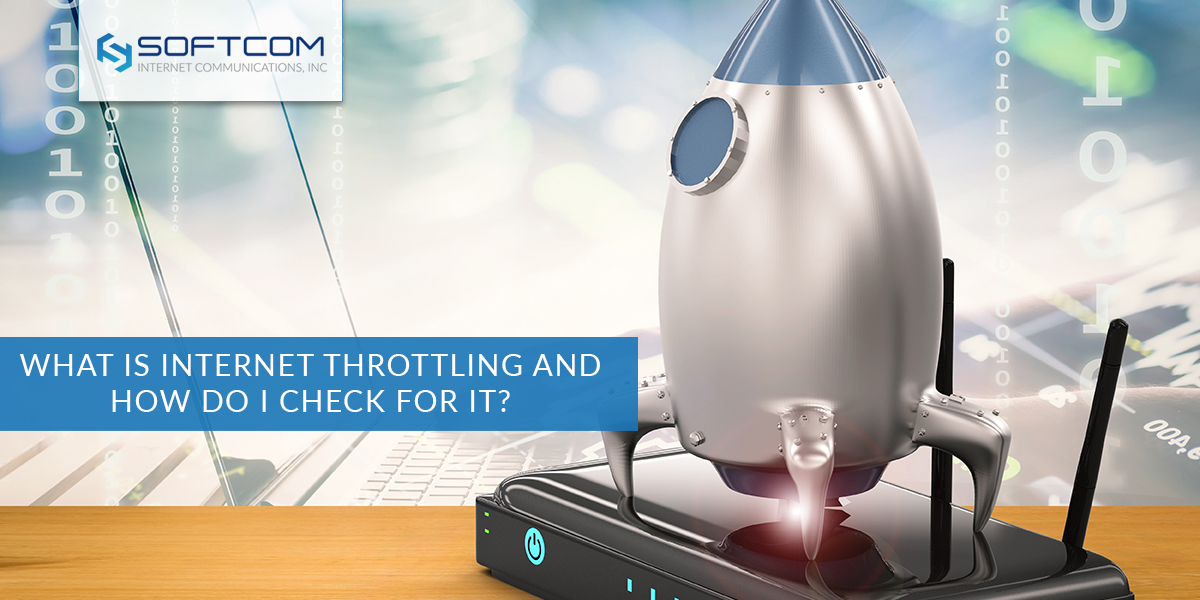Did you know that ISPs are required to disclose certain aspects of their service to their customers, including things like data throttling? Here’s what that means, and why Softcom will never participate in blocking or throttling internet access for its customers.
Throttling is when an internet service provider (ISP) purposely slows down your connection speeds. We’ve rounded up the following information about throttling to educate our readers about this practice, give you the tools you need to research and take action, and assure you that Softcom does not participate in this practice.
What is internet throttling?
Typically, throttling is when your ISP limits your bandwidth at unspecified times. Some of the reasons this happens include if you’ve reached a preset monthly data cap, when an ISP decides to slow certain online destinations, or they need to provide more speed to high-priority customers.
It’s all in the fine print
Throttling is not illegal and if you read the fine print describing the plans you signed up for, you’ll probably see the wording that allows for this. There are a lot of hidden limitations built into those so-called “unlimited” plans. Data may be unlimited, but speeds are not guaranteed as only a certain amount of data per month is guaranteed to be delivered at 4G LTE speeds. As of March 1, 2017, Verizon / AT&T caps it at 22 gigabytes; T-Mobile at 28 gigabytes. After you go over your 4G LTE cap, you are eligible to be “deprioritized” for the remainder of your billing cycle and your connection reduced to “3G speeds.” What this might mean for you is that during the last week of each billing cycle you might notice that your connections become sluggish.
For more information about how “unlimited” plans really work, see this article: The Hidden Limitations of Unlimited Plans.
How to test for throttling
To test whether your ISP is slowing down your Internet connection, you need to measure your connection speeds over time to show patterns or anomalies. Here are a few free tools you can use to test your connection speeds:
SpeedTest® by Ookla®: Quick, easy and free, this website site displays latency (aka Ping) as well as upload and download speeds: https://www.speedtest.net/
Internet Health Test: Offered by net neutrality advocacy group Battle for the Internet and M-Lab, the Internet Health Test website runs five quick bandwidth tests. At the end, you’ll see an overall bandwidth number that provides a good indication of your computer’s online speed at that moment. https://www.battleforthenet.com/internethealthtest/
Netflix FAST Speed test: Netflix created this test to allow you to check whether your ISP is throttling connections to Netflix or not. Compare the results to the speed you see on SpeedTest. If the Netflix speed test results are significantly slower, it might mean that your ISP is throttling your speed: https://fast.com/
What to do about slow internet speeds
For Softcom customers, if you experience slower speeds there are multiple reasons this might be happening – but we can guarantee that it’s NOT because of throttling. Luckily, many of them can be solved at home without calling in a swat team of IT experts.
For a list of reasons that can cause internet slow down and how to fix them, read this article: 6 Scary Things That Can Slow Your Internet Down
If you are a Softcom customer and are experiencing slow speeds, please give us a call at 1-800-982-7675 (opt. 1), but never worry. Our policy is to never throttle or block internet access. We’ll let you know everything you need to know about how your connections works when you sign up, we will even provide resources for a speed test, online invoices, and any other information about your service to keep you informed and satisfied.

